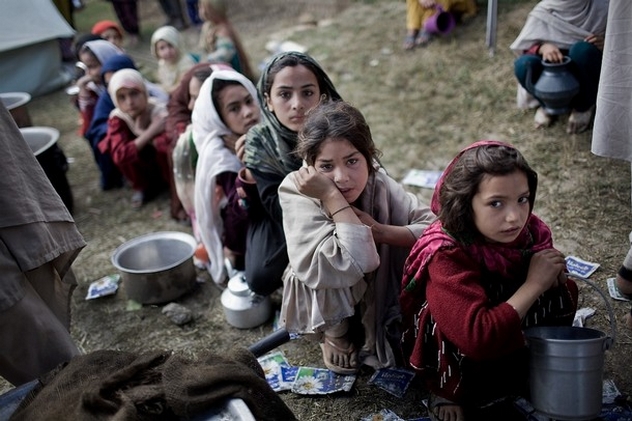Pakistan has been facing a serious humanitarian crisis for many years. Conflicts between the government and armed military groups have been raging across the North-west region since 2004; in addition, the Country is affected by recurring natural disasters and droughts. Cesvi works both in the North and South areas in order to help the communities face this dramatic situation.
North Pakistan: supporting internal displaced people
Due to the armed conflict, the areas bordering Afghanistan (Khyber Pakhtunkhwa Province and the Federally Administered Tribal Areas) have been affected by large-scale displacement for over 13 years. About 2 million people left their houses seeking for refuge in the nearby districts of Bannu and Peshawar. The IDP influx was massive and sudden, and the hosting areas could not provide them with the required facilities. This influx exacerbated the conditions of the existing infrastructure, which was already inadequate to support the local population.
Internal displaced people lack all basic items. They live in poor housing conditions, with insufficient living space for the whole family. Most shelters do not have any sanitation facilities: the context is very unsafe, especially for women, and the risk of water contamination and spread of diseases is real.
In these areas, Cesvi, through the support of ECHO (the office of the European Union for Humanitarian Aid Operations) and other Donors, is implementing a project which aims to meet the most urgent and critical needs of the population. Thanks to this intervention, almost 24,000 people in the target areas could get a better accommodation in the so-called ‘transitional shelters’; the access to sanitation facilities was improved for about 18,000 people; and thanks to the rehabilitation of 142 wells, 100 water pumps, 160 filters and containers, 50,000 people could access safe water sources for their personal use. The awareness activities promoting good hygienic practices involved more than 30,000 participants: such activities are always very important to prevent serious diseases and epidemics. Finally, 30,000 local people were involved in the infrastructure rehabilitation work.
South: responding to drought and malnutrition
The South of Pakistan has been suffering from the consequences of drought for more than 3 years, particularly the Sindh region. The tough weather conditions affected the breeding activities very seriously, and animals were also victims of a number of diseases and epidemics. The Thari community was impacted the most, as their family and market economy is mainly based on livestock. More than 250,000 families – 1 million people – suffer from hunger. The most vulnerable categories are children, pregnant/breastfeeding women and old people. Their health is at risk, as they do not have sufficient and nourishing food.
Thanks to the support of the Italian Government – 8*1000 office, Cesvi is helping them by distributing farm animals and agriculture items to 1,500 people. About 2,000 women received sewing kits so as to develop income generating activities and improve their livelihood.
Besides this, all beneficiaries are involved in training courses on livestock and business management. Finally, 5,500 people are supported through cash for work opportunities, in the framework of a WFP funded project.
Cover photo: Giampiero Gandolfo
